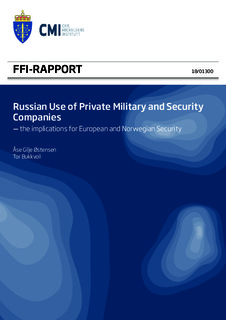| dc.description.abstract | How does the Russian use of private military and security companies affect Russian use of force and what are the implications for European and Norwegian security?
Over the past couple of decades, private military and security companies (PMSCs) have become instrumental to modern warfare. Western PMSCs have so far dominated this trend and hence, the bulk of the academic and media attention has been directed at this part of the industry. However, in recent years, PMSCs have developed in many parts of the world, including in Russia. The example set by the US in particular, and its extensive use of PMSCs in the military operations in Iraq and Afghanistan, is likely to have been a source of inspiration for many other countries interested in expanding their war fighting repertoire and defence industries.
Russian private military and security companies (PMSCs) have recently caused headlines in international media. This is mainly because of the Russian PMSC Wagner’s participation in the war in Syria on the side of President Assad. However, the Russian PMSC industry is larger and more varied than it appears at first glance.
In this report, we start by analysing the historical Russian experience with the use of private force. The Russian Cossacks are of prime importance here. Today these groups are back on the private force market after being curbed during Soviet times. Apart from Cossack groups, also other types of private force providers thrive in Russia, including both private militias, such as Ramzan Kadyrov’s Terek, and the Russian PMSCs. It would be wrong to describe the Russian PMSC industry as large, but the few companies that do exist are very active. In addition to participating in combat in Donbas and Syria, they have also acted as military advisers to the governments of Sudan and the Central African Republic.
There is great variety among the Russian PMSCs. Some, first of all Wagner, are probably more mercenaries than PMSCs, while for exampl | |
